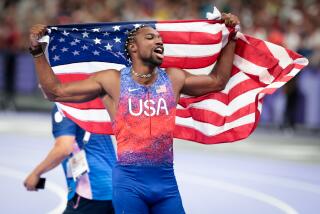Marathon Is a Test of Endurance for South Africa
- Share via
ATLANTA — A man small in stature but carrying the weight of a nation glided into Centennial Olympic Stadium and, waving his arms in joy, made history.
Josia Thugwane became the first black South African to win an Olympic gold medal Sunday when he won the marathon, the final event of the track and field competition. Thugwane won a tactical race that began in 95% humidity and ended in the new stadium before a few thousand spectators.
It was the closest marathon finish in Olympic history. Thugwane outsprinted Lee Bong-Ju of South Korea and Eric Wainaina of Kenya. His winning time was 2 hours 12 minutes 36 seconds. Lee was second in 2:12:39 and Wainaina was third in 2:12:44.
South Africa returned to the Olympic Games in 1992, after an absence of 32 years. The nation was banned from international athletic competition because of its apartheid policy. South Africa had last competed in the 1960 Olympics in Rome, where it sent an all-white team.
Until Atlanta, only white South Africans had won Olympic medals for a nation whose population is overwhelmingly black. That changed last week when Hezekiel Sepeng won the silver medal in the 800 meters.
The gold carries a more symbolic meaning for Thugwane, who dedicated his victory to his country and President Nelson Mandela.
“What the medal means to me is that our problems are over in our country,” Thugwane said. “We are free to run in the international community. We are back in the fold.”
The 5-foot-2, 99-pound runner will undoubtedly become an instant national hero in South Africa, where distance running has a rabid national following. Since the 1970s, black South Africans have dominated the sport, a rare arena in which blacks and white commingled.
“It’s going to have a huge impact on sport in our country,” said Mike Green, editor of Runners World South Africa. “The symbolism of the gold medal is important. Sport has such a unifying effect, and running has always been the one place where black sportsmen could compete.”
During its time of athletic exile, South African sports continued. Internal competition was held to coincide with the Olympic Games that South Africa was not allowed to attend.
It was expected that once South Africa returned to the Olympic family in Barcelona, the sports-mad nation would soon be a dominant force. It didn’t happen. Decades of isolation created generations of athletes who had no experience in international competition.
The success of Thugwane and others here signals the maturation of the next wave of South African athletes.
Life is only now reaching some normality for black South African athletes, although the lives of their white peers are still out of reach. Black runners take to the roads to run weekend road races, earning a few hundred rand. In the race to earn a living, many top runners overcompete and burn themselves out.
Others, like Thugwane, earn their living by competing as representative of diamond or gold mines. The 25-year-old was recruited by the Kooranfontein mine in the eastern Transvaal to play soccer. When his running talent was discovered, Thugwane took over a job as welfare officer at the mine. He said his job entails standing at a gate and patrolling the hostel where the mine workers, he included, live.
The mine paid for Thugwane’s recent hospitalization after an incident that threatened to keep him out of the Olympics. Thugwane was driving alone when he was flagged down by a friend. Three men then burst into his car and Thugwane took off.
There was struggle and Thugwane was shot in the chin. He leaped out of the car while it was still rolling.
His trials before reaching Atlanta make Sunday’s 26.2-mile race seem tame. Which describes the pace for the first half of the course. A pack of about 50 runners grouped together at the start and 25 still were running together at the halfway point.
The slow pace was in deference to the weather, which was not overly hot but was overly humid. At about 17 miles, Thugwane and Lee broke away, with a four-man chase pack seven seconds behind. Wainaina pushed into the hills at 20 miles and separated from the pack to sit clearly in third place.
The Kenyan passed Lee but Lee surged again. The three hung together as they approached the stadium, conserving their energy and preparing for the kick.
Thugwane burst away and entered the stadium first, to applause and cheers.
Well before he crossed the finish line, and moved into history, Thugwane began to wave his arms and smile. It had been a long trip.
(BEGIN TEXT OF INFOBOX / INFOGRAPHIC)
Medalists / Track and Field
Men’s Marathon
GOLD: Josia Thugwane, South Africa
SILVER: Lee Bong-ju, South Korea
BRONZE: Eric Wainaina, Kenya
More to Read
Go beyond the scoreboard
Get the latest on L.A.'s teams in the daily Sports Report newsletter.
You may occasionally receive promotional content from the Los Angeles Times.







